EFS12- Book of abstracts - Contact
EFS12- Book of abstracts - Contact
EFS12- Book of abstracts - Contact
Create successful ePaper yourself
Turn your PDF publications into a flip-book with our unique Google optimized e-Paper software.
SESSION 5: DISEASE CONTROL AND FORECASTING MODELS<br />
P128 - Lactic acid bacteria [LAB]: potential for control<br />
<strong>of</strong> Fusarium growth<br />
N. Dalanaj 1,2 , F. Gaggìa 2 , L. Baffoni 2 , D. Alkadri 2 , P. Nipoti 2 , D. Di Gioia 2<br />
1 Department <strong>of</strong> Industrial chemistry, Faculty <strong>of</strong> Natural Sciences, Tirana University. Bulevardi Zogu i<br />
Parë,Tirana; 2 Department <strong>of</strong> Agricultural Sciences - DipSA, Bologna University, Viale Fanin 44, 40127<br />
Bologna, Italy<br />
E-mail: diana.digioia@unibo.it<br />
Lactic Acid Bacteria [LAB] are worldwide known as probiotic microorganisms. One<br />
<strong>of</strong> the most important probiotic feature is their strong activity against a wide range<br />
<strong>of</strong> harmful bacteria/fungi (Gaggìa et al., 2011). Production <strong>of</strong> organic acids and<br />
production <strong>of</strong> antagonistic compounds are the main mechanisms described<br />
nowadays. This work focuses on the in vitro selection <strong>of</strong> LAB strains isolated from<br />
environmental sources against Fusarium genus. Fusarium is a well distributed<br />
genus <strong>of</strong> filamentous fungi affecting plant, animal and human health. In the<br />
agricultural field, Fusarium is one <strong>of</strong> the most important plant pathogenic genera,<br />
with a record <strong>of</strong> devastating infections in various economically important plants. In<br />
this study, in vitro antagonistic effects <strong>of</strong> 18 isolates <strong>of</strong> Lactobacillus spp. were<br />
evaluated against F. oxysporum f. sp. lactucae, agent <strong>of</strong> trache<strong>of</strong>usariosis in<br />
Lactuca sativa, F. culmorum and F. graminearum, agents <strong>of</strong> severe diseases in<br />
cereals. Fungal inhibition was performed using spot agar test in a triplicate assay<br />
(Magnusson et al., 2003). Overnight cultures <strong>of</strong> LAB were inoculated as spot on<br />
MRS agar plates and allowed to grow at 30°C for 24 h. The plates were then<br />
overlaid with 10 ml <strong>of</strong> PDA containing 10 4 mould spores/ml. After 48-72 h <strong>of</strong><br />
aerobic incubation at 25°C, the zone <strong>of</strong> inhibition was measured. All LAB strains<br />
(except one) showed antifungal activity against all Fusarium species (inhibition<br />
halo between 23.7- 65.3 mm). The highest halos were obtained against F.<br />
graminearum on which 50% <strong>of</strong> the LAB strains showed a total growth inhibition <strong>of</strong><br />
the colony. These results are probably related to the high amount <strong>of</strong> organic acids<br />
produced by LAB strains but it can also be hypothesized the presence <strong>of</strong><br />
antifungal compounds. In vivo application <strong>of</strong> the most successful LAB strains is<br />
foreseen towards wheat and lettuce to confirm in vitro results.<br />
Keywords: LAB, biocontrol, Fusarium, growth<br />
222




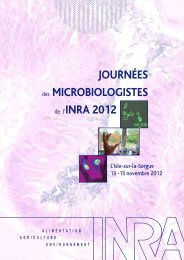

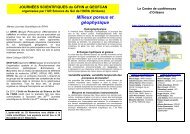
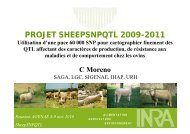
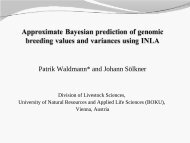
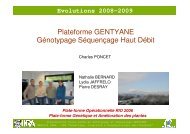
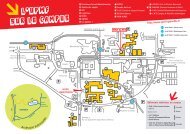
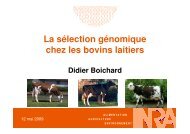
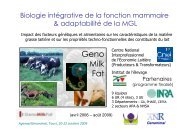
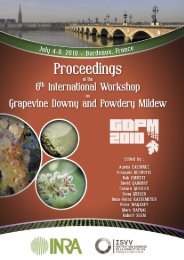
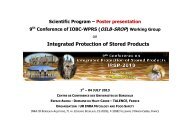
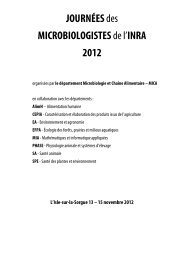
![Présentation CRB-anim [Mode de compatibilité] - Inra](https://img.yumpu.com/17418636/1/190x135/presentation-crb-anim-mode-de-compatibilite-inra.jpg?quality=85)